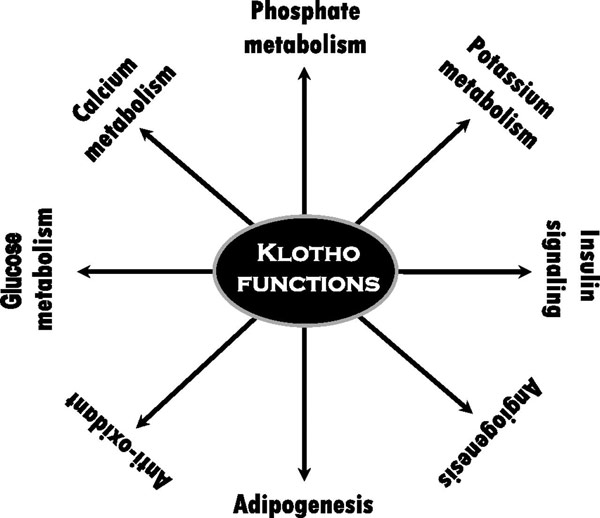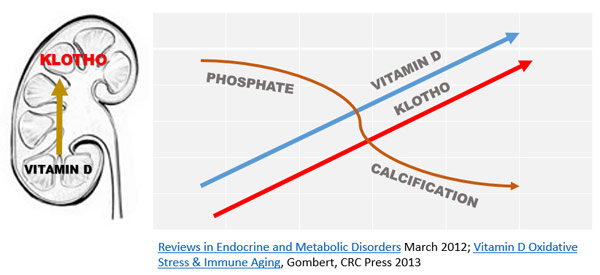ResveratrolConsumer
avert online
consumer fraud
ResveratrolQuiz
test your knowledge
New E-Book
How the world got lost on
the road to an anti-aging pill
Subscribe to our newsletter to receive email notifications when new articles are posted.
May 15, 2014: by Bill Sardi
A gene protein called KLOTHO is being hailed as the new fountain of youth today. KLOTHO gene protein boosts brain skills (thinking, learning, memory), elevating IQ by six points regardless of the age of the person.
According to the news report [Daily Mail UK, May 11, 2014], among 700 subjects age 52-85 years of age, those with an inherited form of the KLOTHO gene called KLOTHO-VS performed better on mental tests. There is less KLOTHO gene protein in the aged brain. [Future Medicinal Chemistry, Sept 2012]
The KLOTHO-VS gene variant is not just a brain enhancing agent but has recently been associated with healthy aging overall. [Rejuvenation Research April 2014] In the animal laboratory biologists bred a unique short lifespan mouse based upon a single gene mutation in the KLOTHO gene. [Clinical Calcium Aug 2002]
KLOTHO gene protein is primarily produced in the kidneys but a shortened version of it travels throughout the circulatory system, say researchers. [Chinese Medical Journal May 2004]
KLOTHO gene protein decreases with age and animals that over-produce KLOTHO live longer.
KLOTHO, named after the mythical Greek god of fate that spins the thread of life, was first discovered in 1997. [Korean Journal Internal Medicine June 2011] It is reported that about 20% of humans have inherited a favorable variant of this gene called KLOTHO-VS which is also associated with reduced risk for cardiovascular disease. In animals, the KLOTHO gene slows progressive high blood pressure and abolishes enlarged heart. [Chinese Journal of Medical Genetics Dec 2012]
A review of three published human studies involving over 700 individuals reveals about 20% of human populations carry a variant of this gene called KLOTHO-VS that is associated with reduced risk for age-related cardiovascular disease. [Heart Jan 2014] This is the first time that KLOTHO-VS has been linked to improved cognition (thinking, memory). [Cell Reports, May 8, 2014]
In the study, KLOTHO gene proteins improved mental function at any age. KLOTHO worked by increasing the amount of a particular type of KLOTHO protein (GluN2B) in the gaps between brain cells called the synapse in the thinking parts (hippocampus and frontal cortex) of the brain. [MedicalNewsToday.com, May 10, 2014]
With currently no effective Alzheimer’s treatment in sight, one can easily understand the importance of this discovery. KLOTHO gene protein has recently been measured in the cerebrospinal fluid of humans. KLOTHO concentrations were lower in women compared to men, in older versus young adults and in Alzheimer’s subjects. [Neuroscience Letters Jan 2014]
News reporters seem to have missed a big point — it’s possible to live long and still retain cognition (mental function) by boosting KLOTHO. That ought to be good news to senior adults concerned about living longer but with dementia. And, a person doesn’t have to wait till their retirement years to benefit.
It is interesting to note mice deficient in KLOTHO grow up normal but rapidly degenerate and age prematurely. [Journal Biological Chemistry Dec. 2013] In experiments where the KLOTHO gene is “knocked out” of animals, the mice suffer early death (live on a median of 60 days), have one-third the body weight of a normal mouse and experience infertility, stiffened arteries, bone loss and breathing problems (emphysema). [Circulation April 5, 2012]
Deficits of KLOTHO protein is associated with premature aging (progeria syndrome). [Mechanics Ageing & Development, April 2010; Experiment Animals 2013]

In a human study of 800 adults in Italy over age 65, 5.6% of those individuals with the highest blood levels of KLOTHO experienced disability in activities of daily living compared to 16.1% among those with the lowest circulating levels of KLOTHO. [Rejuvenation June 2012]
Animals deficient in KLOTHO exhibit weakened muscle strength. [Biogerontology Dec 2013] So it is not a surprise to learn that humans with low circulating levels of KLOTHO exhibit have poor skeletal muscle and hand-drip strength. [European Journal Applied Physiology April 2012]
KLOTHO gene protein is described as a tumor suppressor via its ability to inhibit insulin growth factor-1 (IGF-1) and the p53/p21 genes. [Pathology Oncology Research Oct 2013]
Chronic kidney disease is a growing problem in the modern world. Low KLOTHO levels are considered one of the earliest markers of chronic kidney disease. [American Journal Kidney Disease July 2011] Calorie restriction and addressing KLOTHO deficiency may be therapeutic in this regard. [Kidney Blood Pressure Research 2013] One strong lesson the world is learning is that the health of the kidneys is a barometer of aging via the measurement of KLOTHO.
Prevention of KLOTHO decline and possibly even direct supplementation with synthetic KLOTHO is being considered as a therapeutic strategy for many age-related diseases. [Current Opinion Nephrology Hypertension July 2012] Supplementation with KLOTHO in rodents extends their life by 17.4% and has been demonstrated to reduce calcium deposits in kidney and aortic arteries. [European Journal Pharmacology Jan 2013]
KLOTHO gene protein is not only synthesized in the kidneys but also in the human eye where it is considered an important player in retinal health. [Journal Neurochemistry Dec 2013] The age dependent decline in KLOTHO may contribute to retina degeneration. [Journal Neuroscience Oct 2013] Biologists now say “KLOTHO-regulating protein is vital to sustain retinal function.” [Investigative Ophthalmology Oct 2013]
Hearing loss is common in the later years of life. Hearing loss in animals is linked with excessive production of the active form of vitamin D (calcitriol). KLOTHO keeps a lid on vitamin D. [Hearing Research May 2011]
Consistent with the Overmineralization theory of aging, KLOTHO gene protein regulates phosphate and calcium metabolism. [Glia Jan 2008] KLOTHO-deficient mice exhibit stiffening of their arteries due to calcification and excessive buildup of phosphate. [Korean Journal Internal Medicine June 2011] In fact, biologists are calling “phosphate the new cholesterol.” [Atherosclerosis Feb 2012]
Researchers show that calcification and excessive phosphate in animals are associated with premature aging, low KLOTHO gene protein and poor survival. [Pediatric Nephrology April 2013] Poor production of KLOTHO gene protein results in accumulation of phosphate and accelerated aging. [BBA international journal of biochemistry and biophysics Oct 2009] A low phosphate diet rescues mice that lack KLOTHO. [Journal Nutrition Dec 2001] It has been said that KLOTHO’s main objective is to counter “the negative effects of phosphate” and regulate calcium. [PLoS One April 2, 2014; Science Aging Knowledge Environment May 2006]
There may be some non-molecular ways of boosting KLOTHO. For example physical exercise may increase KLOTHO levels. [American Journal Physiology Heart Circulation Physiology Feb 2014]
Big Pharma is racing to develop KLOTHO boosters to prevent calcification, chronic kidney and heart disease and to promote healthy aging. [Reviews Endocrine Metabolic Disorders March 2012]
A person doesn’t have to be tested to find out if they have inherited the KLOTHO-VS gene variant. They can boost KLOTHO on their own and will likely benefit.
Researchers are hinting at the development of drugs that increase the synthesis of KLOTHO gene protein, but off-the-shelf molecules already exist and have already been tested.
The anti-diabetic drug Avandia (rosiglitazone) increases brain KLOTHO. [Biomedical Research International 2014] Statin drugs and the blood pressure-lowering drug Cozaar (losartan) are also reported to increase KLOTHO. [Nephron Experimental Nephrology Sept 2013; Journal Renin Angiotensin Aldotesterone System Feb 2013] But don’t expect to get a prescription for the purpose of raising KLOTHO protein out of any doctor nor insurance to pay for it.

Pharmacologists are quick to say the active form of vitamin D (calcitriol) in the bloodstream, which is a synthetic drug (Rocaltrol, Vectical, Calcijex) activates KLOTHO and is characterized as a form of vitamin D that may be “the long-awaited panacea for vascular calcification.” [Kidney International Dec 2012]
But natural vitamin D3 (cholecalciferol) available in dietary supplements activates KLOTHO protein because it keeps a lid on potential calcification caused by vitamin D’s ability to increase calcium absorption. [Advances Experimental Medicine Biology 2012] The more vitamin D, the more KLOTHO.
However, for unexplained reasons, vitamin D reduces KLOTHO protein among patients undergoing hemodialysis. [Polish archives of internal medicine 2013]
Magnesium is indirectly involved in KLOTHO gene protein making. When blood serum calcium levels are somewhat below normal magnesium reduces parathyroid secretion and increases parathyroid calcium cell receptor, the vitamin D cell receptor and KLOTHO gene protein. This suggests calcium intake should be limited and magnesium shortages should be avoided for healthy aging. [Nephrology Dialysis Transplantation Feb 2014]
There are also herbal KLOTHO enhancers.
Mushrooms grown in sunlight may elevate KLOTHO by virtue of their vitamin D content. [All About Vitamin D, MushroomInfo.com] For example, cordyceps mushroom has been cited as a KLOTHO booster. [Journal of Central South University. Medical Sciences April 2009]
There are indirect ways to increase KLOTHO’s biological activity, such as the use of the red wine molecule resveratrol that increases vitamin D cell receptor protein. [Journal Steroid Biochemical Molecular Biology Feb 2003] Resveratrol, the red wine molecule, works synergistically with vitamin D and Klotho. [Molecular Nutrition Food Research March 2014; Vitamin D Oxidative Stress & Immune Aging, Gombert, CRC Press 2013] A combination of vitamin D + resveratrol may be in order. ©2014 Bill Sardi, ResveratrolNews.com
Posted in Resveratrol
Add comments »